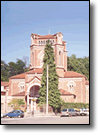MOSCOW PATRIARCHATE
CHRISTIAN ORTHODOX PARISH
"SAINT MAXIMUS, BISHOP OF TURIN"
The church takes spiritual care of the Orthodox Christians under the Moscow Patriarchate in the city of Turin and in Piemonte / Valle d'Aosta .
CHURCH ADDRESS
Strada Val San Martino 7 - Torino 10131
Phone Number: 340-672.1375
Services are in Italian, Church Slavonic and Romanian/Moldavian

THE ORTHODOX PARISH OF THE MOSCOW PATRIARCHATE IN TURIN
The Orthodox parish of the Moscow Patriarchate in Turin is dedicated to Saint Maximus (5th century), the first bishop of the town, and a Church Father. The patron saint's feast is on June 25th (July 8th for the Orthodox who follow the Old Calendar).
The parish was founded in the Diocese of Korsun, like the other churches of the Moscow Patriarchate in France, Italy, Switzerland, Spain and Portugal.
A community of Orthodox Italians gave rise in 1993 to the current parish of St. Maximus. Early in its life the community had no permanent place of worship, and was hosted in various places in the city, before being assigned, in 2001, to the Church of the Most Holy Redeemer (see the picture above), in the hillside of Turin.
The services follow the Typicon (rules and model of worship) of the Russian Church, the language of worship varies according to the origin of the faithful: the most used languages are Italian, Church Slavonic and Romanian.
The vast majority of the faithful comes from the Republic of Moldova, with a sizeable presence of Ukrainian, Russian and Italian Orthodox, and also from other countries (Belarus, Romania, former Yugoslavia, Georgia, Bulgaria).
According to the missionary spirit which has always characterized the Russian Church, our parish, along with its task of pastoral care of the faithful of the Moscow Patriarchate (and by extension of those of Slavic Orthodox tradition) in Piemonte and Valle d'Aosta, seeks to develop a genuinely local community, dedicated to the witness of the Orthodox Faith in the West.
The Italian Orthodox organizers strived not only to set up the parish, but also to welcome immigrant believers in Italy.
For all those who are interested in parish life, we try to work for a cultural grounding of the message of Orthodoxy, especially with the translation of liturgical texts and Church hymnography into the local language.
Since the witness of the Orthodox Faith can not be separated from seeking ideal relationships with representatives of other Christian confessions, our parish maintains an active dialogue on issues of faith with other Christians in Turin.
We have to reject proposals of ecumenical concelebrations (which always carry with them the risk of dogmatic minimalism, and sometimes also of symbolic confusion). Rather, we propose a dialogue of rediscovery of Christian roots (and of all that we have forgotten of our common Church tradition), in addition to a common effort in welcoming immigrants and integrating them into the life of our city.
One of the well known and basic problems of Christianity is to maintain a close community life: for us this is an ideal sometimes difficult to achieve. Our churches are composed of people of different social levels and cultural heritage, and at the same time they have to cope with language barriers and differences in mentality.
Although the parish has no funding, and is supported only by the generosity of all its faithful, we can not forget that many recent Orthodox immigrants are still in difficult economic conditions, and therefore we endeavour where possible to support the needy, alongside of our worship and prayer life.
|